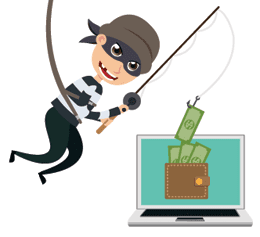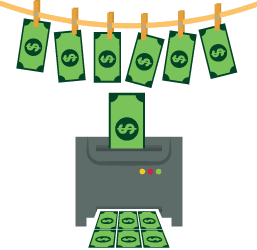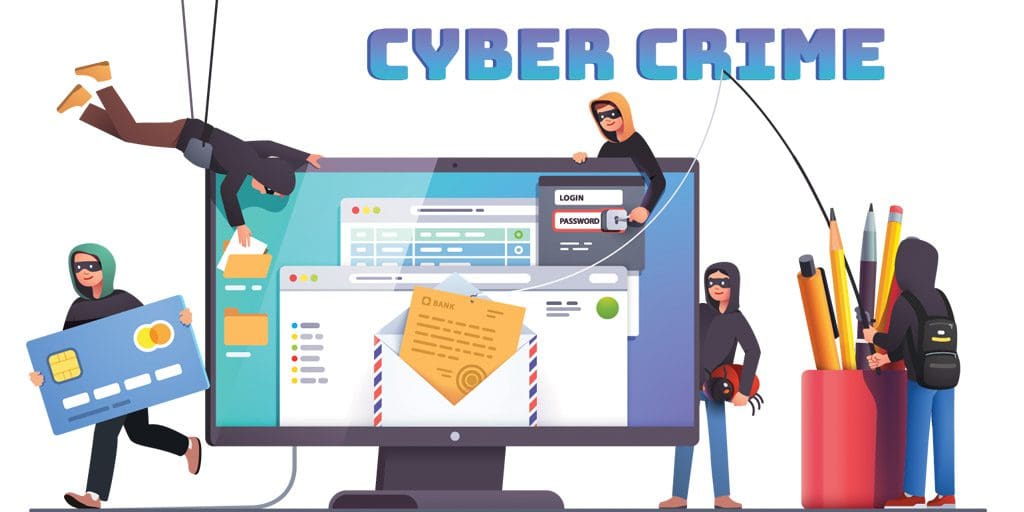Why do people still fall for online scams? Most of us think we're too wise to let fraudsters fool us.
We’re not.
According to a recent survey done by the Better Business Bureau and other organizations, the outlook isn't good. It says one person out of ten in the U.S. will be a scam victim in the upcoming year.
So, here’s a little quiz for you:
- Do you know the five online scams that are working the best for con artists right now? Could you even make a list of three?
It’s important to know things like that—here’s why.
Surveys provide a ray of hope with the scam statistics. The good news is this: if we know what the top scams are, the harder it is to trick us. In other words, the more we know, the safer we are.
So, let’s look at the top five scams that fool people the most.
#1. Online shopping scams.

Consumers are losing billions of dollars to fraud and scams every year, and online shopping scams are one of the top culprits. In the U.S. online shopping scams were the second most reported scams to the FTC and accounted for more than $350 million in losses.
Cybercrooks and con artists go where the money is, so online shoppers must be extra careful when they’re looking for a bargain, a gift or simply saving time by going online. Crafty thieves have dozens of ways to direct your online shopping dollars their way.
They'll try to fool you with fake texts or emails about a delivery problem, or they might contact you with a problem with your credit card. They may try to pretend they’re from your bank, saying there’s been fraud reported on your account, related to a shopping purchase. In some cases thieves acquire bank account numbers and Social Security numbers, then use that information to commit identity crimes.
We’re not only talking about eBay, Craigslist, Mercari or Poshmark scams anymore. Scams will pop up tied to Amazon, Facebook Marketplace, Walmart Marketplace and other well-known brands. In addition, fake or disreputable online shopping sites are also a problem, because it’s hard to know what sites are legitimate and trustworthy and which aren’t.
It's all part of the online shopping fraud epidemic. The best advice? Buyer beware!
#2. Fake tech support scams
 Here’s a scam that uses fear to motivate victims into forking over money. After all, nothing worries us more than having a deadly virus on our computers, such as ransomware. Tech support scams trick you into believing you have malware lurking on your computer. To fix the “problem” they’ve identified, you’ll need to send them money to pay for the repairs—or run the risk losing all your data.
Here’s a scam that uses fear to motivate victims into forking over money. After all, nothing worries us more than having a deadly virus on our computers, such as ransomware. Tech support scams trick you into believing you have malware lurking on your computer. To fix the “problem” they’ve identified, you’ll need to send them money to pay for the repairs—or run the risk losing all your data.
Scammers will play dirty, too. Often times, they will make you believe that Microsoft—the world’s leading software developer—is reaching out to you with a pop-message, an email or phone call. In India in 2018, police raided ten illegal call centers and arrested dozens of scammers who were running a very sophisticated tech support center! Police found live chat apps and scripts for calling and fooling victims.
Microsoft is aware of the problem and, according to their own consumer research, victims of fraudulent Microsoft tech support usually pay (and lose) anywhere between $150 and $500 for worthless tech support. If you see a pop-up ad or a warning screen saying your computer has been infected, ignore it, say the experts. That’s not only a scam, but it’s usually the gateway to a link that might infect your computer!
#3. Employment/job scams
 Job hunters beware, especially if you’re a little desperate for work. Scammers masquerading as employers are eager to meet you.
Job hunters beware, especially if you’re a little desperate for work. Scammers masquerading as employers are eager to meet you.
Many people who think they’ve just gotten a legitimate job, soon end up losing money or having their identity stolen, without ever making any money. And often, those getting scammed are the ones who need money the most! Perhaps they were even joyous that, at last, they were able to land work!
Here are just three possible clues that the job you see posted might be a scam: 1) they don't make you take and interview. 2) It promises good money for not a lot of hours or hard work 3) you can start immediately. (You can see how those features could seem to be beneficial for many job seekers and lure people into the scam.)
Here's what happens if your new job isn't real. You'll get a sizable initial check to buy supplies, for instance. But wait! They ask you to send some money to another employee, out of your own pocket. Of course, they paid you with a worthless check. (Read the next section for more on that.) And sometimes it’s more than money you lose. You give the scammer all your valuable personal information on the job application. They have your Social Security number, drivers license number, home address, and more.
Online Scams: The 10 Cons and Frauds that Fool People the Most. #top10scams #onlinescams Share on X#4. Money order and fake-check scams
 Money orders and checks are at the heart of several scam types…and a tip-off that there could be something wrong.
Money orders and checks are at the heart of several scam types…and a tip-off that there could be something wrong.
The situation is this: you find yourself receiving a check or a money order (maybe for selling an item online, or as part of a new job) and you’re asked to deposit the check in your bank account—but before you do that, the sender tells you to wire or transfer some of the amount back to you. Or maybe you are told to send a portion of the money to someone else.
Why? You were overpaid, you’re told; they sent you $300 instead of $200. Or it’s your first paycheck for $500, and you need to send back $200 for supplies. They might say, “Just deposit the check and send the money. It will all work out.” So, you send the money, and deposit the check in your bank. Of course, you find out in a few days that they sent you a bad check or a fake money order.
You lose twice. For one, you owe the bank the amount they initially gave you (if any), and you lost the money you wired back to the con. To avoid this predicament, NEVER send money to anyone until you make sure they’re check has cleared.
#5. Phony sweepstakes and prize scams
 This scam works well for con artists once they get a target interested…and that’s pretty easy for them to do. The cons reach out to people, often the most vulnerable or needy, with the news and the promise of sweepstakes winnings—sometimes in the thousands or even millions of dollars. It all sounds and looks convincing. There’s a catch, of course.
This scam works well for con artists once they get a target interested…and that’s pretty easy for them to do. The cons reach out to people, often the most vulnerable or needy, with the news and the promise of sweepstakes winnings—sometimes in the thousands or even millions of dollars. It all sounds and looks convincing. There’s a catch, of course.
To get the money, the “winners” must first pay a small upfront fee to claim their prize. That fee might be $10 or $200.
In Missouri, not long ago, the State government shut down a fake sweepstakes that tricked senior citizens into giving scammers millions of dollars. As a director of the FTC said, the older adults “paid money to collect prizes that never materialized.”
This scam, as you might expect, deceives those who are in a financially insecure situation—where a “miracle” influx of cash could be a life changer.
Here’s the main thing to remember: it is not possible for you to win a sweepstakes or contest that you didn’t enter. If someone tells you you’ve won a sweepstakes you didn’t enter—in a letter, email or text—don’t fall for it. Report it instead!
#6. Imposter scams
 The U.S. Federal Trade Commission ranks imposter scams as the most reported con in recent years. By pretending to be the IRS, your bank, the police or other authority figures, these imposters steal money from millions of people every year.
The U.S. Federal Trade Commission ranks imposter scams as the most reported con in recent years. By pretending to be the IRS, your bank, the police or other authority figures, these imposters steal money from millions of people every year.
It’s not that some con artists have a special talent at pretending to be someone they’re not. It’s that the impersonators are very skilled at manipulating victims’ emotions.
An impersonator pretending to be from the Internal Revenue Service instills fear and worry into their victims first, then uses pressure to have them pay back taxes (which don’t exist). Other scammers might pretend to be a friendly banker notifying a customer of an account problem. In that case the thief is friendly, caring and helpful while stealing the victim’s money.
These ruses are very effective because scammers also know how to mimic actual websites and can even spoof phone numbers of the organization’s they’re impersonating. The thieves also know that most ordinary people have a measure of respect for organizations they generally trust.
If you get a message or call from anyone saying they are from your bank, the IRS or any organization saying there is a problem, hang up. Check the phone number they called from or email address they used and look for inconsistencies. Then, look up the organization’s contact information online and see if they called.
#7. Investment and cryptocurrency scams
 People from all walks of life lose money in investment scams: old and young; experienced vs. first-time investors; the greedy and the hopeful. They all have something in common: they’re hoping to find good returns, fast and easily.
People from all walks of life lose money in investment scams: old and young; experienced vs. first-time investors; the greedy and the hopeful. They all have something in common: they’re hoping to find good returns, fast and easily.
The bad news (and a worthwhile reminder) is that scammers have an approach—and an investment opportunity—for everyone. It’s wise to heed the advice security professionals have for everyone: if it sounds too good to be true, it probably is. And today, it’s also probably a scam.
Not only did the cryptocurrency craze not work out the way investors wanted, but thousands of people also lost money to crypto investments that were pure scams from the start.
Investments are risky to begin with, and most investors are willing to take some risks to make a lot of money. If there is a promise of an incredible and quick return, many investors will be tempted to jump in—with their fingers crossed. That’s why more than $1 billion of losses in cryptocurrency scams have been reported in the U.S. alone.
Sadly, many cryptocurrency scam victims were talked into the investment by someone they developed a relationship and trusted. Once the victim’s money was in the hands of the scammer, the romance or relationship was over. Which leads us to #8…
#8. Romance scams
 Romance scams cause financial losses in the millions every year, and that number keeps growing. In 2022, reported losses due to romance scams reached $1.3 billion dollars, following explosive growth year by year.
Romance scams cause financial losses in the millions every year, and that number keeps growing. In 2022, reported losses due to romance scams reached $1.3 billion dollars, following explosive growth year by year.
These scams are especially cruel to victims because it involves both emotional and financial loss and pain. And here’s what’s both shocking and surprising: typically, the romance scam victim never meets their online sweetheart.
It’s easy to think, “how is that even possible?” You would think people would be skeptical of anyone they meet online. And many people are. But scammers know exactly what to say to those they target and how to win over their emotions, trust and eventually, talk them into giving them money.
More than that, for the single or lonely person, there are a lot of dating apps to choose from, for every age and profile. More than that, Facebook and other social media sites offer a way to meet new people, make new friends and possibly find that special someone.
That’s why scammers are on dating apps and social media, pretending to be that person.
#9. Business Email Scams (Spear Phishing)
 Better known as BEC, for Business Email Compromise, business email scams cause some of the largest losses per incident because they target the bank accounts of businesses. In 2022, victims of BEC lost a total of $2.7 billion.
Better known as BEC, for Business Email Compromise, business email scams cause some of the largest losses per incident because they target the bank accounts of businesses. In 2022, victims of BEC lost a total of $2.7 billion.
Any employee that has the authority to initiate a wire transfer at a company should pay attention to this advice: Stop, relax and think before paying any vendor from a request that comes urgently and out of the blue from someone in your company. There is a very high likelihood the request is from a scammer.
BEC often starts with spear phishing—instead of using a wide net to ensnare victims, thieves first research a company executive to impersonate. They also profile and target the exact employee they’ll attack and trick to wire the funds.
BEC is highly effective because companies have multiple vendors to pay, and more than one managers may have the clout to request a vendor payment to be made on demand. And most employees will think twice before refusing an executive’s demand.
Through these highly coordinated attacks, usually done by criminal enterprises in faraway countries, scammers can steal money, identities, business secrets and launch ransomware…none of which are good for business.
#10. Charity scams
 When a major, tragic event takes place, such as an earthquake, hurricane or devastating fire, people want to know how they can help. As our hearts go out to the victims, scammers get ready to send out texts, emails and phone calls to potential targets of a charity scam.
When a major, tragic event takes place, such as an earthquake, hurricane or devastating fire, people want to know how they can help. As our hearts go out to the victims, scammers get ready to send out texts, emails and phone calls to potential targets of a charity scam.
Scammers know we are susceptible to being generous (and fooled) when charitable donations are needed. It doesn’t have to be a natural disaster either: It can also be during the holidays, the annual season of giving. Scammers know how to make it easy for you to give by creating fake charities or impersonating well-known ones, like the Red Cross.
A scammer might also contact you to support other genuine worthwhile causes, such as help for military veterans, the homeless or troubled teens. If you have a special place in your heart for these people in need—or you feel bad for never having made a donation—you may easily become a scam victim.
You don’t need to give up donating to charities, but you should decide never to donate from a solicitation that comes to you. Also, if you have donated in the past, beware of “follow-up” calls from someone claiming to be with that organization.
But making any donation do your research. There are online resources that can help you find the charities that truly need your support and will get it to the people who need it…not the scammers who want it.
The Easy Prey Podcast
Don’t let your friends and family become victims. There are two things you can do right now.
- Follow the Easy Prey podcast. Each week you can learn more about scams and online dangers avoid them.
- Share this information with your friends and family. Help keep everyone you know safe.
You can find the Easy Prey podcast on iTunes, Google Play and other media player platforms.
Listen to the Easy Prey podcasts.
The more you know, the safer you are.



ok, thanks for info !!!!
I’ve had identity theft, including numerous banks opened in my name and debit cards used to rack up thousands of dollars. I have been trying get loans over a year now. (My stupidity, I know). This group of people called Marketing Partner’s offer help guides for financial relief, including grants. So the catch is they make you get a loan for benefits and grants that they get free. So they find poor, desperate people and make money off them. Then they want you to open a new bank account (another new account) supposedly to keep it safe or just to deposit the money for you) of course I’ve never seen a penny of any of it. One of the biggest fraud’s ever.